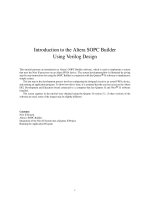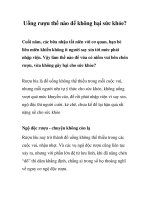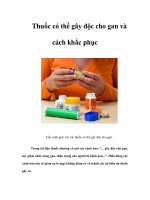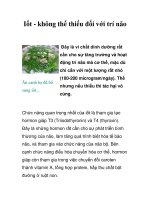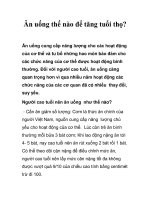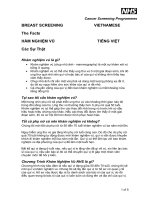Tài liệu Hospital English: the Brilliant learning workbook for international nurses ppt
Bạn đang xem bản rút gọn của tài liệu. Xem và tải ngay bản đầy đủ của tài liệu tại đây (3.25 MB, 192 trang )
Hospital English:
the Brilliant learning workbook for international nurses
Catharine Arakelian
Mark Bartram
Alison Magnall
Radcliffe Medical Press
Radcliffe Medical Press Ltd
18 Marcham Road
Abingdon
Oxon OX14 1AA
United Kingdom
www.radcliffe-oxford.com
The Radcliffe Medical Press electronic catalogue and online ordering facility.
Direct sales to anywhere in the world.
Hospital English: the brilliant learning workbook for international nurses
© 2003 Catharine Arakelian, Mark Bartram and Alison Magnall
The right of Catharine Arakelian, Mark Bartram and Alison Magnall to be identified
as the authors of this Work has been asserted by them in accordance with the
Copyright, Designs and Patents Act 1988
All rights reserved. No part of this publication may be reproduced, stored in a
retrieval system or transmitted, in any form or by any means, electronic,
mechanical, photocopying, recording or otherwise without the prior permission of
the copyright owner.
British Library Cataloguing in Publication Data
A catalogue record for this book is available from the British Library.
ISBN 1 857758641
Typeset by Meg Richardson
Printed and bound by T J International, Padstow, Cornwall
Contents
Foreword by Maura Buchanan 7
Before you start Welcome 9
How to use this book 10
How this book is organised 10
Your new professional identity 12
Stages on the journey of cultural adaptation 13
Getting ready 15
Unit 1 1.1 Noticing ‘real’ English 16
1.2 Words words words 18
1.3 Cultural map of chatting 21
1.4 If you don’t know, ask 24
1.5 Where I work 27
1.6 The National Health Service 28
1.7 The pluses and minuses of working in the UK 30
Assignment Make a detailed plan of your clinical area 32
Unit 2 2.1 Hello Goodbye 34
2.2 Words that stand out 37
2.3 Taking phone calls 39
2.4 Who do you know? 47
2.5 Organisation of care 48
Assignment Make an organisation chart of all the people who work 50
in your clinical area
Unit 3 3.1 Intonation’s important, innit? 52
3.2 What use is a dictionary? 53
3.3 Sub-technical language 55
3.4 Admitting your patient 56
3.5 Maria’s story - Asking your supervisor for feedback 60
3.6 Kolb and reflective learning 62
Assignment Create a user guide for a piece of equipment 66
Unit 4 4.1 Short forms 68
4.2 Linking sounds together 69
4.3 Telling an anecdote 70
4.4 Confidentiality 72
4.5 How’s your bridging? 74
4.6 Acknowledging your limitations 76
4.7 Review 79
Assignment Make a profile of one patient’s experience of hospital 80
Unit 5 5.1 Health promotion 82
5.2 Handover 87
5.3 Hospital diet lexicon 94
5.4 Making suggestions 98
5.5 Rhythm of English 100
5.6 Interpreting graphs 102
Assignment Prepare a short talk on a clinical subject 108
Unit 6 6.1 Moving and handling 110
6.2 Communication while moving a patient 113
6.3 Maria’s story - Assertiveness 116
6.4 Moving and handling lexicon 120
6.5 Word families 122
6.6 Being part of a team 126
6.7 The ward round 128
Assignment Interview two members of your team. Make a questionnaire 132
Unit 7 7.1 Transferring your patient 134
7.2 Making phone calls 137
7.3 Record keeping 140
7.4 The legal framework 143
Assignment Transfer of care in your hospital 146
Unit 8 8.1 Infection control 148
8.2 Communication while giving personal care 151
8.3 Did you get a sample? 154
8.4 Slang on the loo 156
8.5 Your competency framework 160
8.6 Present your talk 162
Assignment Assess your language and communication skills 163
and make an action plan
Brilliant resources Building my Brilliant portfolio 166
Working with a
Brilliant buddy 167
Making and taking a
Brilliant call 170
Pilot’s alphabet 172
Self-assessment 174
Strategies for learning by yourself 176
Keys to exercises 178
Notes to trainers A note about the cultural perspective 186
How this book is organised 186
Suggested assignment timetable 188
Communication skills classes proposed outline structure 189
Suggested marking criteria for assignments 190
About Arakelian Programmes 192
Hospital English – Brilliant summary of the units
Unit Professional Working with Language Scope of Assignment
Focus Others Study Practice
1 The National If you don’t Noticing ‘real’English The pluses and Make a detailed
Health Service know, ask minuses of working plan of your
Words words words in the UK clinical area
Where I work
Cultural map of
chatting
Make an
2 Who do you know? Taking phone calls Hello Goodbye Organisation of organisation chart
care of all the people
Words that who work in your
stand out clinical area
3 Admitting your Maria’s story - Intonation’s Kolb and reflective Create a user guide
patient Asking your important, innit? learning for a piece of
supervisor for equipment
feedback What use is a
dictionary?
Sub-technical
language
4 Confidentiality How’s your Short forms Acknowledging your Make a profile
bridging? limitations of one patient’s
Linking sounds experience
together of hospital
Telling an anecdote
5 Health promotion Handover Hospital diet Interpreting graphs Prepare a short
lexicon talk on a clinical
subject
Making suggestions
Rhythm of English
6 Moving and Communication Moving and Being part of a team Interview two
handling while moving handling lexicon members of
a patient The ward round your team.
Word families Make a
Maria’s story - questionnaire
Assertiveness
7 Transfering your Making phone calls Record keeping The legal framework Transfer of care in
patient your hospital
8 Infection control Communication Did you get a Your competency Assess
while giving sample? framework your language and
personal care communication
Slang on the loo skills and
make an action
Present your talk plan
Acknowledgements
The programme is indebted to the five hundred plus international nurses from twenty-
three different countries who have worked and studied with us over the last four years
at the Oxford Radcliffe Hospitals NHS Trust, the University Hospitals of Leicester NHS
Trust and other hospitals. They have tested our new ideas, suggested improvements
and shown honesty, courage and a sense of humour throughout. We are particularly
grateful to the international nurses who commented on the first drafts of this book.
Units 1-4 were originally published by Arakelian as Hospital English: The Essential
Communication Programme for International Nurses Book 1.
The authors would like to thank all the lecturers at Oxford Brookes University who
contributed their ideas to the programmes delivered in 1999–2001.
A big thank you to the current Arakelian licensed associate teachers: Sally Ballard,
Christine Dowling, Stephanie Gosling, Juliet Henderson, Ann Lee, Mark O’ Rourke,
Carole Robinson, Lyndsey Senior, George Taylor and Felicity Ziegler who continue to
improve the teaching and learning experience with their nurses and in the process
improve our understanding of what it feels like to settle and work in a new culture.
A particular thank you is owed to Marion Pahlen, now teaching in Germany, for her
generous contribution of the ideas behind giving and getting feedback.
Thank you to our families who have allowed us the space to write.
Foreword
by Maura Buchanan BA RGN
PGDip (Clinical Neurosciences)
Deputy President,
Royal College of Nursing
Senior Nurse,
Oxford Radcliffe Hospitals NHS Trust.
Communicating effectively in a foreign language requires a level of understanding that
goes far beyond the learning of vocabulary and grammar.
Textbook English is seldom the language of the workplace. Apparently familiar words
and phrases may both amuse and confuse the learner when used in different contexts.
Nowhere is this more evident than in the field of healthcare.
The Arakelian Programme introduces international nurses to the culture of the health
service in the United Kingdom.
Catharine Arakelian has demonstrated tremendous insight into the development of
communication and language skills. Her approach makes learning English a fun
experience. The exercises encourage good listening and observation skills, essential
elements of mastering a foreign language.
Many international nurses have already completed the programme and have
successfully adapted to our health service, including some working with me in Oxford.
It has been a joy to see their communication skills develop as the programme
progresses. Their confidence and their professionalism are testimony to the success of
this approach.
This book will serve as a useful tool for mentors and supervisors of international
nurses. Mentors will gain greater self-awareness and some insight into the peculiarities
of our own culture.
Nursing is a truly global profession, providing opportunities for individuals to gain
valuable experience in other healthcare systems. International nurses have much to
offer us. Their own cultures, as well as their clinical skills, greatly enrich UK nursing.
In today's multicultural health service, good communication is key to safe nursing
practice and to the delivery of a service that meets the needs of patients, similarly from
diverse backgrounds. I am sure that this series of books will provide a solid foundation
enabling international nurses to competently practise their profession in the UK.
About the authors
Catharine Arakelian, BA RSA Dip TEFLA
Catharine is an intercultural education consultant, teacher trainer and researcher in
adult migrant worker education. She graduated from Bristol University in 1984 and
worked as a theatre director. Between 1994-2001 she was a senior lecturer at Oxford
Brookes University where she was Director of the Oxford Brookes University
International Summer School.
Mark Bartram, BA RSA Dip TEFLA
Mark is an English Language Teaching consultant, writer and teacher trainer. He
graduated from Durham University in 1979, before going to live and work in Italy. On
coming back to the UK in 1989, he was the academic director of a language school in
Oxford for 10 years before setting up Atlas English, an English language school for
juniors. He has published numerous books on English language teaching, including
Correction (LTP) and Initiative (CUP).
Alison Magnall, MA RSA Cert TEFLA RN RSCN HVCert
Alison qualified as a general and paediatric nurse in 1985 at Alder Hey. She worked as
a Health Visitor for six years in London. She maintained her registration and continued
working after completing her degree at the University of Oxford. Since 1999 she has
worked with international nurses on Arakelian Programmes developing specialist
teaching materials and co-writing Hospital English.
To the International Nurse
Welcome!
It’s Brilliant to see you!
You are an expert in your field.
You have had many years of training
and experience.
You are needed and welcome.
Whether you have been here for a few months or have just arrived, this working
environment is still very new to you. Adjusting to the working culture of the UK will
take you some time. Don’t be surprised!
This short programme in communication skills gives you new confidence to make the
changes and to equip you with some personal survival strategies so you can work,
study and live without becoming over-stressed.
In fact, we want you to feel
Brilliant!
Your career in the UK has no ceiling. You can be the best and earn the best if you believe
in your own power and potential. This programme will show you how to turn your
aspirations into realities by working with others as a valued professional.
Welcome and good luck in your new jobs. Be
Brilliant!
Catharine Arakelian Mark Bartram Alison Magnall
9
Before you start
10
Hospital English
How to use this book
This book is for you to use by yourself in the hospital where you work or in a classroom
with a trainer or language teacher.
If you are working through this book by yourself, talk to your supervisors about the
tasks and find someone, preferably a native speaker or someone who has been in the
UK for several years, who will act as a mentor. You should write your answers in the
book and show them to others so you can practise your new skills with your team and
the other people around you. Normally you will find that people are very interested in
your workbook and will want to help you.
It is more effective (and much more fun) to follow this workbook with a friend. Try to
find another nurse in the hospital who might want to work alongside you on this course.
See Working with a
Brilliant Buddy on page 167.
How this book is organised
There are eight units which provide around three hours structured study each week and
many opportunities for reflection and observation in the workplace.
Each unit has four sections:
Language Study
We find out why English can seem so hard to hear and how you can be more easily
heard by your team and patients. We look at how native speakers speak so fast and how
to improve your own listening skills.
Professional Focus
We look at aspects of your duties in an acute hospital from handover to discharge
planning. We look at how you communicate with your team and your patients – what
words you say and how you say them.
Remember every hospital has its own policies and procedures so we invite you to check
all the information with a more senior team member to see how it is the same or how it
is different from your previous workplace.
Working with Others
This section shows you how to become recognised as a good team-player and
communicator by adopting culturally appropriate strategies that really work. We show
you how to be effective in common workplace situations such as giving and receiving
feedback on your work.
11
Before you start
Understanding your Scope of Practice
Better communication skills and greater confidence lead to more opportunities for taking
on responsibilities and extending your professional role. This section looks in detail at
aspects of the United Kingdom Nursing and Midwifery Council Code of Professional
Conduct and helps you understand what is meant by such terms as accountability and
autonomy.
Exercises, tasks and assignments
Complete these tasks either in class or in your own time when you are at work.
Some exercises provide quick practice in aspects of language – normally vocabulary and
pronunciation. (If you feel you need more language development then you may need to
go to a bookshop and buy a good grammar practice book in General English.)
Tasks are either
observation or reflective tasks.
Observation tasks need to be carried out while you are at work. They build up your
understanding of the behaviour and language around you.
Reflective tasks can be carried out while you are on the bus or in a quiet corner. These
aim to bring together your knowledge and experience so you can grow in self-awareness
and plan your own learning.
There is an
assignment at the end of each unit. This is a more substantial piece of
work which you can start keeping in your
Brilliant portfolio.
See Building My
Brilliant Portfolio on p 166.
Answer keys to exercises
The answers to a number of the exercises are at the back of the book. Look out for the
key symbol. These are suggested answers only. Your answers may be equally as good.
Try to answer the questions from your own experience before turning to the key.
References
References are written in the text next to the quotation. Most of the books and journals in
the references should be available in your hospital library.
You might decide that you don’t need to do every assignment and task. That’s fine! You
can dip in and do any task or exercise in any order if you want. Do what you have time
and energy for.
12
Your new professional identity
Adapting to a new workplace requires an effort to build the professional identity you
wish to project. You have to balance the need to earn the trust of your colleagues
because you are an unknown quantity, against losing face by revealing your own lack of
knowledge of the new workplace.
You need to find a professional way of demonstrating and sharing your clinical
expertise within the legal framework of the UK whilst clearly expressing your own
needs. Your team and supervisor will help you to learn.
You can help them by writing about your progress and being honest about your
experience – the ups and downs. We teach you how to create and use two special books
– My Professional Identity Notebook and My Personal Lexicon – for these notes. Your
communication skills will quickly improve and you can use these to reinforce your
value and skills in the hospital.
Your cultural map
The knowledge about how to behave in a certain situation can be considered
metaphorically as a behaviour map which is culturally accurate.
Your old behaviour map, which perfectly fits your previous culture, may not be useful
in predicting how your actions will be viewed in the new culture.
Your behaviour may not have the desired effect. Other people may see you as rude or
passive. They may simply avoid trying to understand you by referring to their own
cultural map of prejudice to explain your behaviour.
As you work through this book you will be building up knowledge about how people
behave in this culture. The book and the people around you, if you ask them, will guide
you. This knowledge constitutes a new cultural map which you can now use to develop
your relationships and nursing practice.
You may need to change your own behaviour so do not expect results immediately. You
will certainly need to practise new culturally appropriate behaviours before they seem
natural to you. Remember your cultural map may not be complete and you may need
additional experiences before it is consistently useful.
As a competent international nurse you will have been making these maps throughout
your travels. On this programme we make the process explicit so you can explore and
develop quickly in a safe environment.
There are cultural maps specific to the NHS, and even more subtle ones specific to your
own hospital and clinical area. You will develop your noticing skills on this programme
and will soon have mapped the uncharted territories! All this work we ask you to keep
in My Professional Identity Notebook. After that, it is up to you!
Hospital English
Cultural adaptation
In adapting to a new culture you go through different stages of emotional adjustment.
The stages are called honeymoon, disintegration, reintegration, independence and
autonomy. You may be in the honeymoon stage for a long time if you have a well-
supported induction programme.
You don’t necessarily spend very long at each stage and you probably don’t spend an
equal amount of time at each stage. You may not even be conscious of the different stages
but when you look back on your first year in a new culture you might be able to identify
when you moved through each stage. The crucial thing is not to get stuck in the negative
stages. When you experience the lows, recognise that they are a normal part of adjusting
to a new culture and relax. You may find that being able to identify where you are on
your psychological journey helps you feel better and move on.
It is quite normal for this adjustment process to take a year or more before you feel
really comfortable in your new cultural shoes.
13
Before you start
Initial
excitement
and
happiness in
starting a new
job in new
culture
New culture
perceived as
threat to personal
stability, feeling
overwhelmed,
helpless,
disorganised
Indifference, anger
and/or retreat from
new experiences
New situation
accepted,
facing reality,
open to new
experiences
Sense of
self-worth
and feeling
in control,
satisfying
experiences
Honeymoon
time
your mood
Disintegration
Independence
Reintegration
Autonomy
Stages on the journey of cultural adaptation
Cultural Adjustment Curve
14
Are you feeling well adjusted?
Consider the Cultural Adjustment Curve on page 13 which describes what you might
be going through in each stage.
Over the next few months mark your current mood on the chart. Every week record
your new level of confidence. Time is marked along the horizontal axis (measured in
weeks). The vertical axis is indicating your confidence and so could be said to be
measuring your ‘adjustment’. I hope you have an ever rising curve!
You may find that if you are transferred to a new area or move to a new role or take on
new responsibilities you go through the same stages all over again but now perhaps
you can recognise the cycle and cope better.
Hospital English
time
Remember it’s natural to feel
out of your depth when you’re
out of your culture but you’ll
soon be getting along
swimmingly
mood
☺
123456789101112131415
15
Before you start
Getting ready
You will need
Essential
• Hospital English: the Brilliant learning workbook for international nurses
• Pen or pencil
• Energy
Useful
• My Personal Lexicon
Please buy an A5 or smaller bound notebook to be My Personal Lexicon
A lexicon is a collection of words. My Personal Lexicon – your own personal
collection of words – you can build up when talking with your patients, colleagues
and friends. Note down new words you hear in the workplace as you find them –
ask for explanations if they are unfamiliar to you.
• My Professional Identity Notebook
Please buy an A5 or A4 bound notebook to be My Professional Identity Notebook.
Reflective practice enables you to learn effectively from your work and personal
experience. Throughout the programme you are invited to note critical incidents in
your professional and social life and to reflect on your experiences.
Desirable
•ABrilliant Buddy – See page 167
1.1 Noticing ‘real’ English
Even if you have studied the English language for a long time, you may find the ‘real’
English you hear every day in the UK is very different!
‘Real’ English
• is spoken very quickly
• uses different or unusual expressions – and even different grammar.
1.1.a
Look at the six expressions below and decide if they were said by
• a nurse (N)
• a patient (P) or
• a friend outside work (F).
Mark them with N, P or F accordingly. Some of them may have more than
one answer! There is an example to help you.
1 That’s healing up nicely.
N
2 Fancy a drink this evening?
3 Just pop your foot up here.
4 I’m getting a lot of sharp pains up the side.
5 This is the offending ankle, is it?
6 It just doesn’t seem to have come right.
7 What did you get up to at the weekend?
What did you notice about these expressions? One thing is that we often miss out
words – for example ‘(Do you) fancy a drink this evening?’ in example 1.1.a 2.
Second, we often use slang or colloquial words instead of the ‘proper’ ones – e.g. pop
instead of place or put in example 1.1.a 3 or get up to in example 1.1.a 7.
Finally we can use ironic or slightly jokey language to reassure the patient, or to make a
bond with the patient, as in the offending ankle in example 1.1.a 5.
Wea
16
1
unit
Noticing ‘real’ English
Words words words
Cultural map of chatting
The National Health Service
The pluses and minuses of working
in the UK
Make a detailed plan of your
clinical area
If you don’t know, ask
Where I work
1
Language study
unit
17
Word partnerships
1.1.b
Match the verb on the left with the phrase on the right to make useful
expressions. The first one has been done for you.
1 make
2 do
3 have
4 get
5 give
6 do
7 sound
8 have
These expressions are very common in spoken English. You will find it is much easier to
talk to colleagues and patients (and understand them) if you can use word partnerships
like these.
1.1.c
Label the word partnerships above according to where you would hear
them. Which ones in the task above would be used:
• in everyday English conversation outside work (EE)
• on the ward – Hospital English (HE)
• both?
The first one has been done for you.
1.1.d
Collect six word partnerships, three from
outside work, and three from the ward.
Write them in the box below:
very well
a mistake
fine
the cleaning
a listen to your chest
a good time
a CT-scan done
somebody the option to do something
both
Buy a spiral bound
notebook that will fit in
your pocket and start
writing down useful
word partnerships and
expressions you hear.
Call this book My
Personal Lexicon
1 How big should a lexicon be?
a too big for your pocket
b just big enough to fit in your pocket
c so small you can lose it easily
2 Why should I write new words and
expressions down?
a so that I can forget about them
b to waste a bit of time at work
c to remember them more easily
3 Should I organise the lexicon in some way?
a yes, that makes it easier to find things
b no, better to have it a complete mess
c it doesn’t matter as long as you’re happy
4 What things should I write down?
a anything that you might find useful in the future
b everything you can
c as little as possible
5 Should I write down abbreviations like DNA*?
a no, you’ll be using them every day, so
there’s no need
b yes, any and every abbreviation will be useful
c it’s up to you
* if you don’t know what this means, ask!
6 If I notice a new word, how should I write it
down?
a on its own, then you won’t get confused
b in an expression or chunk
c with words that start with the same letter
7 What else should I write down about the word?
a nothing, you haven’t got room in a small book
b everything you can
c anything important or useful about it
8 What do you mean by important or useful?
a spelling
b pronunciation
c style (if the word is very formal or slang)
d technical or non-technical
e if it’s British or American English
f any or all of the above if you think they
are important
9. What other use is there for My Personal
Lexicon?
a to write notes for your blockbusting novel
about hospital life
b to make shopping lists
c to use as a tool for communication
10 What do you mean by a ‘tool for
communication’?
a because if your colleagues see you are
writing things down, they will be more helpful,
speak slower etc
b because if you write things down, you’ll
remember more and so speak better
c because if your colleagues see you writing,
they’ll think you really want to learn, and
so they will be more willing to
communicate with you
b
1
Hospital English
unit
18
Language study
1.2 Words words words
One of the most useful tools you can have to improve your communication is a small
notebook in which to write down useful words and expressions that you notice around
you. Call this notebook My Personal Lexicon.
1.2.a
Here is a quiz about My Personal Lexicon. For each question, only one
answer is correct. See how many you can get right!
Don’t forget to tell people what you are
doing otherwise they may feel you are
spying on them! Try saying
• That’s interesting. Do you mind if I
write that down? or
• I’d like to write that down. Is that
okay? How do you spell that?
1
Language study
unit
19
Wajagunnadooabahdit?
English people speak so quickly!
Have you noticed this?
You might hear a person say
and it takes you five seconds to realise they were saying
by which time they have gone off somewhere and
you’ve lost a chance to have a drink!
Or they might say
and you only understand later that they were saying
The English do speak quickly: kappatee sounds like one word, but in fact it is 4! But that
is not the only reason they are difficult to understand. A second reason is that English
people do not say all the sounds equally, and in fact they pronounce certain sounds
very quickly and ‘weakly’. This is why people often say the English ‘eat’ their words.
More examples:
How would you say this word: America. Try asking an English person to say it.
They will probably say something like
and the quicker they say it, the more they sound like they are eating the word.
Now try these words:
banana photograph policeman
You can hear that one or two parts of the words are said much more strongly or loudly
than the others:
aMERica, baNANa, PHOtograph, poLICEman.
The other bits get lost, or eaten. We say that the strong bits are stressed and the ‘eaten’
bits are unstressed.
uh – mair – ri – kuh
kappatee?
A cup of tea?
wajagunnadooabahdit?
What are you going
to do about it?
1.2.b
Look at these six words from clinical settings. Indicate the bit of the
word which is stressed (said most strongly).
radiographer intravenous
condition deteriorate
haemorrhage department
It is not only true of words. The same thing happens with expressions and whole
sentences. Look at this common expression: Nice to meet you.
Ask an English colleague to say it naturally. Which bit is stressed?
Most people stress the word meet:
Nice to MEET you.
o o O o
(Or, with bubbles: Nice to meet you.)
If you get the stressed bit right, it often doesn’t matter much how you pronounce
the other bits. And when you listen, listen out for the stressed bit, as that is the
important bit.
1.2.c
Look at these common expressions. Mark the bit which is stressed.
The first one is done for you.
O
1 Please sit down.
2 Have a nice day!
3 Mutton dressed as lamb.
4 Who’s a mucky pup?
5 What did your last servant die of?
Do you know when we use these expressions? Find out from a colleague!
1
Hospital English
unit
20
1.3 Cultural map of chatting
1.3.a
Are these statements usually true or false
a about Britain
b about your country?
Write T or F in the box
1.3.b
Have you noticed what British people say when they are chatting?
Write down what they say:
to introduce the topic of the weather
It is normal to start a conversation by talking about the traffic.
People at parties will introduce themselves without being introduced
by the host.
It is perfectly OK to chat socially to a patient you do not know.
If a woman is invited out for a drink by a man,
it is perfectly OK to say no.
You do not ask for someone’s telephone number the first
time you meet.
It is OK to be a little late for a dinner party, but if you are very late,
you must apologise.
Vegetarians are seen as very strange people.
to introduce themselves informally
to refuse an invitation
to ask for someone’s telephone number
to apologise for being late
Bit chilly today, isn’t it?
Britain Your
country
1
Language study
unit
21
1
Hospital English
unit
22
Chatting about youself
As an international nurse, many people will be interested in you and your background.
So you will often need to pass over information about yourself in a brief and
interesting way. This will help other people to:
• engage with you
• remember you afterwards!
One way is to develop a quick chatty biography about yourself.
This should include:
name
country of origin
what you are hoping to do in the UK (future plans)
an open question which helps to make a bridge
to the other person
If your name is particularly interesting, you could say something about that.
I’m …
I’m from …
I’m looking forward to …
What about you …
Hi - My name is
Sentebaleng, I’ve just started
on Ward 4 – I come from South Africa.
My name means Forget-me-not.
I’m just getting to know about UK names.
Do any English names
have meanings?
Hi – I’m Lani
from the Philippines. I’m new
to Ward 4 but I’m looking forward to
having my own patients soon. It’s a really
big hospital. What do you think I should get
to know first about working here? How do
you think I could get to know the people
here better?
1
Language study
unit
23
1.3.c
Try and do the same thing for yourself. What would you say? Write some
notes in the bubble and then use the notes to make a
quick biography about yourself.
Choose a quiet place where you won’t be disturbed, such as your bathroom.
Practise your spiel on your own. Then try it out on a colleague and see what they think.
After you are happy with it, go out and try it on everybody you meet socially. The more
you try it, the better it will sound.
draw yourself here
1.3.d
People are interested in why so many international nurses are working in
the UK. Answer these common questions in a brief but polite way.
You don’t need to give your whole life story but it’s good to have a short answer
that you are comfortable with.
Why did you come to work in this hospital?
Why did you come to work in the UK?
1
Hospital English
unit
24
1.4 If you don’t know, ask
In the modern world, everybody needs information. Whether we are new to a job, have
just come on shift, or simply have never been told, we need to know.
1.4.a
Think of some information you would like to know. Write it as a question or
request here.
Look at the flow-chart
Work through the flow-chart for that particular request.
Now go out and get the answer to your question!
Excuse me, I wonder if
you would possibly be kind enough to
tell me the time, please?
1
Working with others
unit
25
You need to
know something
Can you find it out
by yourself?
Ask somebody
Find out from
your colleagues
Do you know who is the
best person to ask?
When is a good time
to ask this person?
Start here
?
Do so!
Y
e
s
Y
e
s
Y
e
s
Where can I find
out about…?
N
o
N
o
D
o
n
’
t
k
n
o
w
Who would
know about…?
Do you need this
information urgently?
Ask your
question
anyway!
Ask your
question
Y
e
s
Y
e
s
Y
e
s
N
o
N
o
t
s
u
r
e
N
o
N
o
Do you know the right
way to ask this person?
Wait
Now
Not
now!
Are you feeling
confident?
Ask your mentor or colleague
how they would ask about this
What would you
do in my
situation?
How to ask if you don’t know

